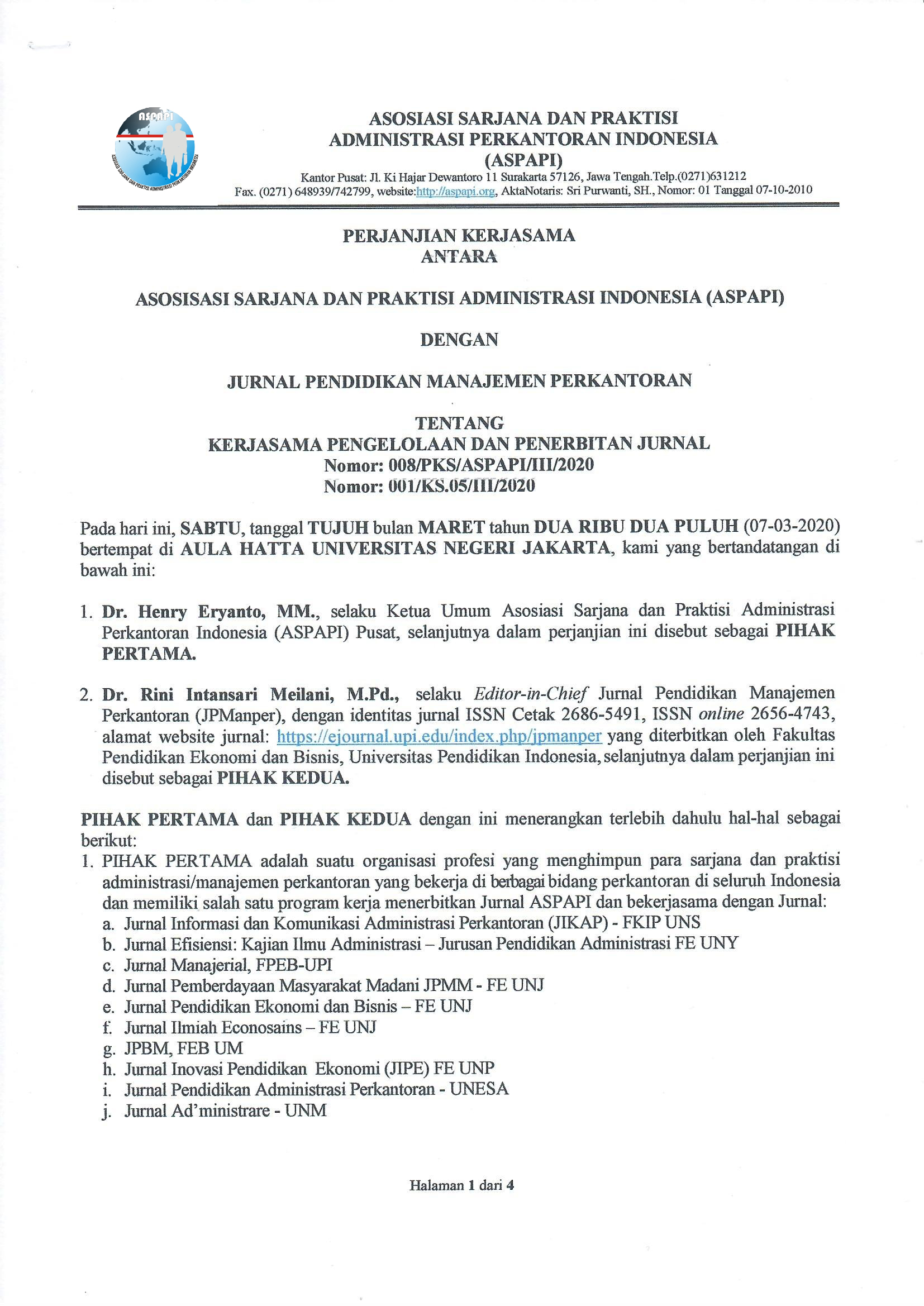Fasilitas belajar dan metode mengajar guru sebagai faktor yang mempengaruhi hasil belajar peserta didik
Abstract
Research aimed to analyze influence learning facilities and teaching methods as a factor in affecting student learning outcomes. The research method used explanatory survey method. Data collection technique used questionnaire rating scale 5 scale models. Respondents are 70 students of vocational high school in Cimahi. Data were analyzed using simple regression. Data analysis techniques use multiple regression and product moment correlation. The result revealed that the learning facilities and teaching methods to learn both partially and simultaneously, has the positive and significant influence toward students learning outcomes.
ABSTRAK
Penelitian ini bertujuan untuk menganalisis pengaruh fasilitas belajar dan metode mengajar guru sebagai faktor yang mempengaruhi hasil belajar peserta didik. Metode penelitian menggunakan explanatory survey. Teknik pengumpulan data menggunakan angket skala 5 model rating scale. Responden adalah 70 siswa Sekolah Menengah Kejuruan (SMK) di Kota Cimahi. Teknik analisis data menggunakan regresi ganda dan korelasi product moment. Hasil penelitian menunjukkan : bahwa fasilitas belajar dan metode mengajar guru baik secara parsial maupun simultan memiliki pengaruh positif dan signifikan terhadap hasil belajar.
Keywords
Full Text:
PDFReferences
Analoui, F. (1995). Teachers as managers: an exploration into teaching styles. International Journal of Educational Management , 9 (5), 16-19.
Aziz, A. A., Yusof, K. M., & Yatim, J. M. (2012). Evaluation on The Effectiveness of Learning Outcomes from Students Perspectives. Procidia-Social and Behavioral Sciences, 22-30.
Ball, D. L., & Forzani, F. M. (2009). The Work of Teaching and the Challenge for Teacher Education. Journal of Teacher Education , 60 (5), 497-511.
Barnawi, dan Arifin, M. 2011. Manajemen Sarana dan Prasarana Sekolah.Yogyakarta: Ar-Ruzz Media.
Crowther, F., & Olsen, P. (1997). Teachers as leaders – an exploratory framework. International Journal of Educational Management , 11 (1), 6-13.
Daryanto (2013) Standard Kompetensi dan Penilaian Kinerja Pendidik Profesional. Yogyakarta: Gava Media
Daryanto, Farid, Mohamad (2013). Konsep dasar manajemen pendidikan di sekolah. Yogyakarta: Gava Media
Ekwunife-Orakwue, K. C., & Teng, T. L. (2014). The Impact of Transactional Distance Dialogic Interactions on Student in Online and Blended Environment. Computers & Education, 414-427.
Erdogan, Y., Servet, B., & Deniz, L. (2008). Factors that influences academic achievement and attitude in web base education. International Journal of Instruction , 1, 31-48.
Ergul, H. (2004). Relationship between student characteristics and academic achievement in distance education and application on student of Anadolu University. Turkish Online Journal of Distance Education , 5, 81-90.
Gudeva, L. K., Dimova, V., Daskalovska, N., & Trajkova, F. (2012). Designing descriptors of learning outcomes for Higher Education. Procedia - Social and Behavioral Sciences 46, 1306-1311.
Harley, K., Barasa, F., Bertram, C., Mattson, E., & Pillay, S. (2000). “The real and the ideal”: teacher roles and competences in South African policy and practice. International Journal of Educational Development , 20, 287-304.
Lawanson, et al. (2011). “Provision and Management of School Facilities for the Implementation of UBE Programme”. Journal of Educational and Social Research. Vol. 1. (4), 47-55.
McCrindle, A. R. (1995). The Impact of Learning Journal on Metacognitive and Cognitive Processes ang Learning Performance. Learning and Instruction , 5, 167-185.
Molstad, C. E., & Karseth, B. (2016). National Curricula in Norway and Finland: The Role of Learning Outcomes. European Educational Research Journal , 15 (3), 329-344
Mushtaq, I., & Khan, S. N. (2012). Factors affecting student academic performance. Global Journal of Management and Business Research , 12 (9), 16-22.
Nasrallah, R. (2014). Learning Outcome role in higher education teaching. Education, Bissines and Society , 7 (4), 257-267.
Nemeth, J., & Long, J. G. (2012). Assessing Learning Outcomes in U.S. Planning Studio Courses. Journal of Planning Education and Research , 32 (4), 476-490.
Pickard, Angela. (2004). “Sustaining Motivation and Fostering Excellence Education” International Journal of Arts and Humanities Citation. Vol. 4 No. 7
Pham, Huang. (2011). Theory-Based Instructional Models Applied in Classroom Contexts. Literacy Information and Computer Education Journal (LICEJ). Vol. 2. No. 2. , 406-415.
Reynolds, W. M. (1988). Measurement of Academic self. Journal of personality assessment .
Roestiyah, N. K. (1988). Strategi Belajar Mengajar: Salah Satu Unsur Pelaksanaan Strategi Belajar Mengajar (Teknik Penyajian). Jakarta: Bina Aksara
Shahril, M. I., Salimin, N. B., & Elumalai, G. a. (2015). The Validity and Reliability of ISO Test Towards The Performance Assessment of Future Physical Education Teachers in Teaching and Learning Process. Social and Behavioral Sciences, 814 – 820
Subowo, dan Utomo, Budi Dwi. 2009. “Pengaruh Fasilitas Laboratorium Dan Motivasi Belajar Terhadap Prestasi Belajar Komputer Akuntansi”. Jurnal Pendidikan Ekonomi. Vol. 4 (1). hal: 33-50
Suharsimi, Arikunto. 2009. Dasar-Dasar Evaluasi Pendidikan. Jakarta:Bumi Aksara.
Schmidt, J. A., & Padilla, B. (2003). Self esteem and family challage: An Investigation of their effect on Achievement. Journal of youth and adolescence , 32.
Tella, A. (2007). The impact of motivation on student academic achievement and learning outcomes in mathematics among secondary school student in Nigeria. Eurasia Journal of Mathematics, Sciences & Technology Education , 3, 149-156.
Toom, A., Husu, J., & Tirri, K. (2015). Cultivating Student Teacher's Moral Competencies in Teaching during Teacher Education. International Teacher Education: Promising Pedagogies , 22 (C), 13-31.
Tudor, I. (1993). Teacher roles in the centred classroom. ELT Journal , 47 (1), 22-31.
Vesekinovska dkk. (2011). The effect of teaching methods on cognitive achievement in biology studying. Procedia Social and Behavioral Sciences, 15, 2521-2527
Vries, S. d., Grift, W. J., & Jansen, E. P. (2013). Teachers‟ beliefs and continuing professional development. Journal of Educational Administration , 51 (2), 213-231.
Young, M. E., Klemz, B. R., & Murphy, J. W. (2003). Enhancing Learning Outcomes: The Effects of Instructional Technology, Learning Style, Instructional Methods and Student Behavior. Journal of Marketing Education , 25, 130.
DOI: https://doi.org/10.17509/jpm.v4i1.14964
Refbacks
- There are currently no refbacks.
Copyright (c) 2019 Jurnal Pendidikan Manajemen Perkantoran
Jurnal Pendidikan Manajemen Perkantoran View My Stats



